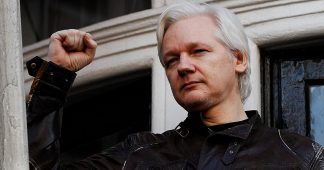January 8, 2021
There was a hope in some quarters after Judge Vanessa Baraitser ruled on Monday against an application to extradite Julian Assange to the US, where he faced being locked away for the rest of his life, that she might finally be changing tack.
Washington has wanted Assange permanently silenced and made an example of – by demonstrating to other journalists its terrifying reach and powers of retaliation – ever since the Wikileaks founder exposed US war crimes in Iraq and Afghanistan a decade ago.
There were reasons, however, to be suspicious of what Baraitser was really up to even as she made her ruling in Assange’s favour. This district judge has a record of nodding through extradition cases, including several that have recently been overturned on appeal by a higher court
Tomorrow, District Judge Vanessa Baraister will rule on Assange's US extradition.
The Ministry of Justice blocked our FOI request for a list of cases on which she's ruled since being appointed a DJ in 2011.
So we used Westlaw + Factiva to construct her extradition case list? pic.twitter.com/ViCuMHhe6i
— Matt Kennard (@kennardmatt) January 3, 2021
During the hearings back in September, Baraitser had endlessly indulged lawyers representing the US while showing absolute disdain for Assange’s legal team, obstructing them at every turn. Her contempt for Assange and his political and moral worldview was on show throughout the proceedings. She often arrived in court with a prepared script she read from, barely feigning a pretence that she had listened to the legal arguments presented in court.
Her script always favoured Washington’s line, apart from on those occasions when she took an even more hostile position towards Assange than requested by the US. That included sealing him off from the rest of the court in an impregnable perspex box, treating him more like Hannibal Lecter than a publisher and journalist fighting for press freedom.
Much of the time, Baraitser sounded unnervingly like a prosecution barrister rather than the judge.
First, a dangerous ruling
My latest: The last decade has been about discrediting, disgracing and demonising Julian Assange. Today's court ruling denying his extradition to the US – though hugely welcome – should be seen as a continuation of that process https://t.co/FtrDGyHwF2
— Jonathan Cook (@Jonathan_K_Cook) January 4, 2021
So it was barely surprising, as I explained in my previous story, that, while denying the extradition claim, she supported all the arguments advanced by the US accruing to itself the right to prosecute Assange – and any other journalist – for the crime of doing journalism. She ignored the facts, the expert testimony presented in court and the legal arguments – all of which favoured Assange – and backed instead what amounted to a purely political case made by the US.
She disregarded warnings from Assange’s legal team that acceptance of the political rationale for extradition amounted to an all-out attack on fundamental journalistic freedoms. She established a terrifying legal precedent for the US to seize foreign journalists and prosecute them for “espionage” if they expose Washington’s crimes. Her ruling will inevitably have a profoundly chilling effect on any publication trying to dig out the truth about the US national-security state, with terrifying consequences for us all.
But while she enthusiastically backed the political case for Assange’s extradition and trial, Baraitser at the same time got the Wikileaks founder off the hook by accepting the humanitarian concerns raised by medical and prison experts. They had counselled that extradition to the US could be expected to lead to Assange spending the rest of his life in a barbaric US super-max prison, exacerbating mental health problems and the risk of suicide.
Then, a perverse ruling
Her ruling, while deeply disturbing in its political and legal implications, did at least suggest that Baraitser was ready to take a compassionate approach in regard to Assange’s health, even if not his journalistic exposure of western war crimes. He should have walked free there and then, had the US not immediately said it would appeal her decision.
Given Assange’s discharge by Baraitser, his team hoped that bail – his release from a high-security prison while the lengthy appeals process unfolds – would prove a formality. They hurried to make such an application after the extradition ruling on Monday, assuming that the legal logic of her decision dictated his release. Baraitser demurred, suggesting that they prepare their case and make it to her more fully on Wednesday.
It now seems clear the judge manipulated Assange’s defence team. Apparently like Assange’s lawyers, former British ambassador Craig Murray, who has attended and reported on the hearings in detail, was lulled by Baraitser into assuming that she wanted a cast-iron case from the defence to justify a decision to release Assange on bail.
There were good reasons for their confidence. Any move to prevent his release would look perverse given that she had decided Assange should not be extradited or stand trial in the US.
Suicide danger
They were deceived. Baraitser denied bail, effectively signalling that she thinks her ruling might be wrong and overturned in a higher court. That is extraordinary. It suggests that she has no confidence in her own judgment of the facts of the case. As Murray has noted: “There was little or no precedent for the High Court overturning any ruling against extradition on Section 91 health grounds.”
Any appeal by the US against Baraitser’s ruling to discharge Assange will be hard to win. Its lawyers will have to prove that she was wrong not on her interpretation of the law, but in assessing verifiable facts. They will have to show that she was deceived by prison experts who warned – based on submissions made by the US itself – that Assange would be subjected to permanent, inhuman solitary confinement in a US super-max jail or that she was misled by medical experts who warned that in these conditions Assange would be at significant risk of suicide
Julian Assange is one of just two inmates at Belmarsh maximum security prison—which houses 797 prisoners—being held for violating bail conditions, according to figures released to me last year.
Over 20% of the Belmarsh prison population is held for murderhttps://t.co/W1RT5s48oJ
— Matt Kennard (@kennardmatt) January 6, 2021
But the perversity of Baraitser’s decision runs deeper still. Her ruling keeps him locked up in Belmarsh, a high-security prison in London that is Britain’s version of a super-max jail. Her refusal to free him, or put him in house arrest with a GPS monitoring tag, flagrantly contradicts the expert assessments she concurred with during Monday’s extradition decision: that Assange is at high risk of suicide. Those expert evaluations are based on his current state – caused by his incarceration in Belmarsh.
Unlike Assange, most of Belmarsh’s inmates have been convicted or charged with major crimes. But while Assange long ago served out his only offence, a minor violation of the UK’s bail regulations, he has been routinely held in even worse conditions than the other prisoners.
If Assange’s mental health is in such poor shape and he is so likely to commit suicide, it is because of the horrifying regime of abuse he has already faced in Belmarsh over the past nearly two years – a regime classified as torture by the UN’s expert on the subject, Nils Melzer. Raising Assange’s hopes of release and then shutting him back in his cell, denying him the chance to see his partner and two young children for the first time since March, risks tipping him over the edge – an edge Baraitser herself is only too aware of and on which she based her decision to deny extradition
Nils Melzer, the UN expert on torture: 'Julian Assange has been brought to breaking point by 10 years of joint persecution for political reasons by Sweden, by the UK, by the US, by Ecuador.. He should not have been brought to the point where he is suicidal' https://t.co/GFArFyhrRt
— Jonathan Cook (@Jonathan_K_Cook) January 4, 2021
No ‘flight risk’
In fact, the judge was up to something else entirely in delaying the bail hearing till Wednesday, two days later. She wanted – as presumably did those who have been supervising her behind the scenes – to refashion the image of her court, which for months has given every appearance of being entirely beholden to the US administration.
As the corporate media briefly raised its head from its slumber to meaningfully acknowledge for the first time the Assange hearings, she wanted to ensure those reports noted how independent her court was. For two days, commentators could crow about British legal sovereignty and humanitarian values, even as most tacitly accepted her dangerous premise that the US has a justified claim to extradite Assange.
When Baraitser slammed the cell door shut once again on Assange, leaving him exactly where he was before she discharged him, her decision was presented as little more than a technical ruling based on a reasonable assessment of Assange’s “flight risk”.
In fact, Assange is no flight risk, and never was. He didn’t “jump bail” in 2012 by heading into the Ecuadorean embassy. He sought political asylum there to escape the very real threat of being extradited to the US for his journalism. He was accepted by the Ecuadorean authorities because they believed his fears were genuine.
Back then, a Swedish prosecutor had revived demands Assange return to Sweden for questioning over flimsy sexual assault allegations – allegations that had been dismissed by a previous prosecutor. That investigation, we now know, was kept alive at British insistence. Nonetheless, Sweden refused to give assurances that they would not extradite Assange on to the US, where a grand jury was drawing up charges against him.
Illicit collusion
Assange’s decision to seek asylum in the embassy has, of course, been entirely vindicated by the fact that the US did indeed seek his extradition – as soon as they could get their hands on him.
Baraitser even let the cat out of the bag herself at the bail hearing, disrupting her own narrative that he had “absconded” in 2012, when she stated – as evidence against Assange! – that he entered the embassy to evade the threat of extradition to the US.
In doing so, she undermined the narrative promoted for years by every corporate media outlet in the UK that Assange had “holed up in the Ecuadorean embassy to flee the Swedish investigation”. (In fact, that statement was typically corrupted even further by the media, including notably the Guardian, which repeatedly referred not to an investigation, one going nowhere, but to entirely imaginary “rape charges”.)
Baraitser exploited and accentuated Assange’s suffering to make her court look good, to add a veneer of credibility to her deeply flawed political ruling, and to create the impression that she was making her judgment based on the facts rather than illicit collusion with US authorities denying Assange his rights.
Where next?
Where does the case head now?
Assange’s only immediate hope is that his legal team can appeal the bail decision and win, or that the US throws in the towel and decides not to submit its own appeal on the extradition ruling within the next couple of weeks.
If Washington does press for an appeal, as still seems likely, Assange faces many more months in Belmarsh high-security jail, in declining health in Covid-infested conditions he may not survive if he catches the disease. As experts have warned, the toll taken by nearly two years of almost no contact with other humans, no mental stimulation, no prospect of release – his case ignored by most of his peers and the public – will intensify his sense of despair, his deep depression, and the danger that he tries to take his own life.
His death looks increasingly like an outcome Britain and the US desire, and possibly one that they have been striving towards. That is certainly the conclusion of Yanis Varoufakis, a public intellectual and former Greek finance minister who has seen up close himself how ready European and US elites are to ruthlessly crush dissent
"They are not trying to extradite him. They are trying to kill him."@yanisvaroufakis explains why he thinks the US State Department wants Julian Assange dead.#Downstream pic.twitter.com/wPDeMyd9EW
— Novara Media (@novaramedia) January 6, 2021
But even if Assange’s death is not the goal of the US and UK authorities, they have recklessly ensured that possibility grows ever more likely, and will continue to do so until they swiftly bring his incarceration and torture to an end.
Published at www.counterpunch.org











